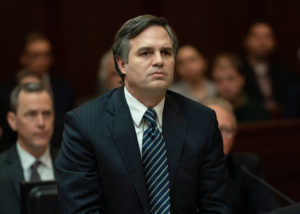Incluvie Foundation Gala - Learn More
'Dark Waters' Review: A Gripping, Near Perfect Tale
I highly recommend Dark Waters. It’s a highly engrossing picture, which lends itself to cautionary storytelling. The dark information continually grows, inspiring change and accountability altogether. Overall, Haynes’ picture will not be known for its inclusiveness--but it will be known for being a fantastic, engrossing film.
Dark Waters (2019)


In a world so apathetic and complicated, doing the right thing will always be difficult. Dark Waters (Todd Haynes’ latest film) is a perfect representation of this statement. It’s a tale of immense discomfort, solely focused on the efforts of one good man. At every point, it shows us the importance of structured morality, a concept that demands humanistic responsibility.
In the film, we meet Rob Bilott (Mark Ruffalo), a corporate defense attorney. After hearing about corporate irresponsibility, he builds a cohesive case, hoping to expose ugly truths. In the process, he finds himself battling an overwhelming system, brimming with criticism and irritable sensibilities. The end result is a fantastic, gripping experience.

From a visual standpoint, Dark Waters has a naturalistic look, perfectly suitable for a narrative that is based on a true story. Haynes and cinematographer Edward Lachman have crafted a subdued world, consisting of atmospheric pressure and commercial shadiness. We feel the murkiness that lies underneath the surface. And as the film moves along, the gloomy narrative thickens, unleashing a web of carelessness.
Even with its investigative ties, Dark Waters flows like running water (pardon the pun). The informational dumps are inter-cut with personal endeavors and investigative realization, making the entire narrative feel like an ongoing entity of progression. A ton of praise must be given to Affonso Gonçalves, the film’s editor. His editing creates a breezy narrative, complete with consistent momentum and tremendous coherence. Even when the film slows down, the minor instances of deceleration feel justified. It’s clear that Haynes and Goncalves want us together eel the discomfort that comes with such courage.
Dark Waters possesses an abundance of sadness and dysfunction, but it doesn’t steer its way into a depressing realm of viewership. The small bits of humor go a long way in providing relief, and much of that is due to the screenplay and performers. As the titular character, Ruffalo gives perhaps his best performance since Zodiac (2007). He is the epitome of goodness, and in time, his arc is both heartbreaking and inspirational.

Though there are many amazing things to say about Dark Waters, it is important to note that the film struggles with diversity. Though this can partially be attributed to it being based on a true story, if you’re looking for a diverse film, you should look elsewhere. Haynes has created a masterful piece of cinema with Dark Waters, but the lack of diversity is noticeable.
In closing, I highly recommend Dark Waters. It’s a highly engrossing picture, which lends itself to cautionary storytelling. The dark information continually grows, inspiring change and accountability altogether. Overall, Haynes’ picture will not be known for its inclusiveness–but it will be known for being a fantastic, engrossing film.

Originally published by Dillon McCarty for Incluvie on January 8, 2020.
More to explore
By Same Author
Related lists created by the same author
By General Category
Related movie/TV/List/Topic
Me and 'My Best Friend Anne Frank'
This film is based off of The Diary of a Young Girl, which was written during the Holocaust period.




